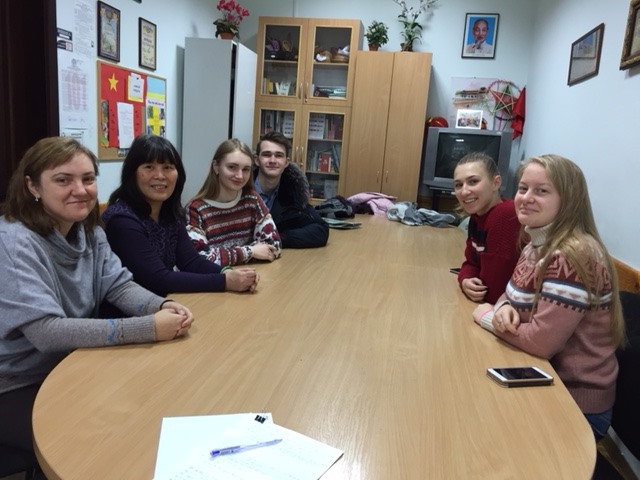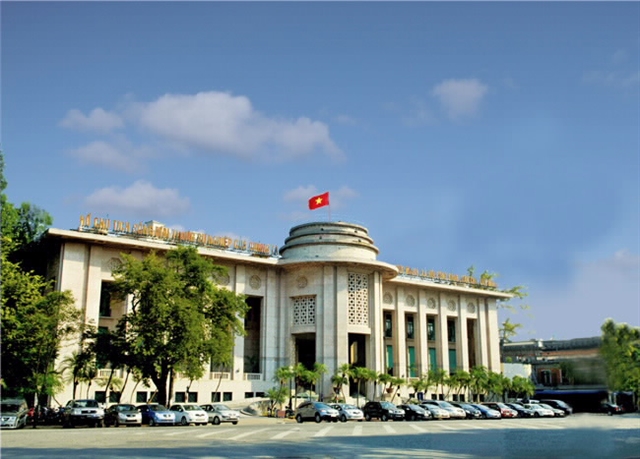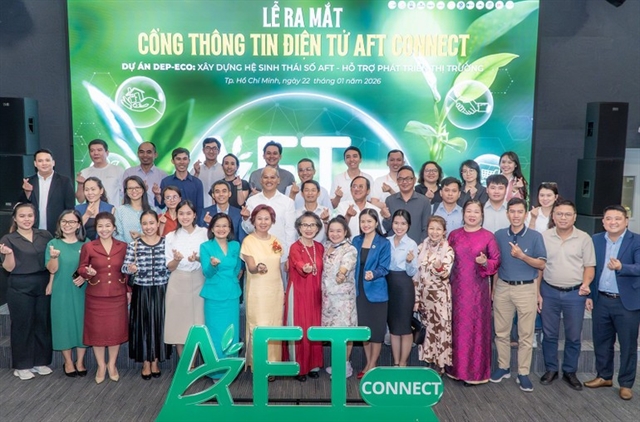

Hà Thị Vân Anh is a Vietnamese national living in a country in eastern Europe called Ukraine. She is teaching Ukrainians how to speak Vietnamese.
 |
| Pioneers: Ukrainian teacher Victoria Musiychuk and Hà Thị Vân Anh (first and second left) are pioneers inspiring local students to learn Vietnamese. VNS Photo Ngân Bình |
Hà Thị Vân Anh is a Vietnamese national living in a country in eastern Europe called Ukraine.
She is teaching Ukrainians how to speak Vietnamese.
Her students love the language.
One of them once told her: “It feels like I was born in Việt Nam. I love the Vietnamese language so much.”
By Ngân Bình, for Việt Nam News from Kiev, Ukraine
One autumn day, a Vietnamese teacher at a university in Kiev asked me to go for a walk.
“I have just completed writing a new curriculum to teach Vietnamese to Ukrainian students. I need some fresh air and time to relax because it’s taken me two months,” said Hà Thị Vân Anh.
Walking through the large park under the shadow of big trees and breathing in the fresh air, Anh happily told me the story of her journey as a bank official in Việt Nam to becoming a teacher in the Ukraine. She’d been longing for a breakthrough and had finally made it with a 200-page Vietnamese-Ukrainian bi-lingual textbook, the first of its kind.
During those two months, she stayed at home and struggled with the book, and experienced a number of sleepless nights. “I wanted the students to have a new textbook for the 2018-2019 school year. Now it’s a reality.”
Co-operation on education and training has been playing an important role in bilateral ties between Việt Nam and Ukraine. In September 2012, the National University in Kiev, or the Taras Chevchenko University, pioneered teaching Vietnamese as one of five foreign languages at the university. The Department for Eastern Asian Languages now teaches Chinese, Korean, Japanese, Vietnamese and Indonesian. The university was founded in 1834 and is among the best universities in the country.
Anh moved and settled in Kiev in 1993 when her husband started work in the country. She wanted to adapt to the local culture so enrolled at a university. After six years, she obtained a degree in Russian from the Kiev University of Foreign Languages.
Settling in Ukraine
“The country is beautiful and the Ukrainian people are as hospitable as the Vietnamese people. This helped me decide to stay and consider Ukraine as my second home.”
Teaching Vietnamese was not her passion at first. She needed a job to live on and clear the homesickness.
Time passed, and the more contact she had with the Ukrainian students, the more she found to teach the Vietnamese language.
Anh, born in the northern province of Thái Bình in 1961, said she was moved to hear a third-year Ukrainian student tell her that after a six-month programme in Việt Nam: “It feels like I was born in Việt Nam. I love the Vietnamese language so much.”
“My students often send me their comments and feedback after returning from Việt Nam. All their messages inspire me to do something to encourage them to master Vietnamese and for the development of my mother tongue in my second home,” Anh said.
Fourth year student Natalia Kovalchuk who visited Việt Nam and stayed for five months wrote to her: “After the trip to Việt Nam, I realise that I not only love its language but the country and its people as well. I miss Việt Nam’s coffee shops, beautiful sites and narrow buildings. I enjoyed the delicious food and happily met smiling people.
“I was also surprised to see the number of motorcycles on the streets; even four family members are comfortable on a motorbike, then fruit vendors and barbers on the pavements… All these things are unique to Việt Nam and make me want to return.”
Another student, Katerina Panamarenko, said she could not explain why she decided to study Vietnamese four years ago. “Maybe it was fate,” she said. Before studying the language, Katerina knew nothing about Việt Nam, but she has not regretted her decision.
Panamarenko spent nine months on a student exchange programme between the Taras Shevchenko University and the Hà Nội National University. “It was my first time living in a foreign country but I felt comfortable. My Vietnamese friends were friendly and helpful. I also miss surprising the Vietnamese kids by speaking in their language.”
Fifth year student Snigur Margarita misses Việt Nam after visiting the country a year ago. She was proud to enroll at the National University in Kiev, and decided to study Vietnamese in the Department of Eastern Asian Languages. Margarita said that last year’s trip to Việt Nam not only helped improve her Vietnamese but also understanding about the country’s culture. She said the Vietnamese language was inseparable with her future career.
Inspirations
Anh started teaching Vietnamese in 2007 when she was a fourth year student. The only textbooks available were those published by the National University.
She realised that a new curriculum was needed to teach Vietnamese to Ukrainian students. She knew that the content of the new materials must be adapted to the students while at the same time used efficiently by potential Ukrainian teachers of Vietnamese in the future.
Anh said Kovalchuk, Panamarenko and Margarita were her most gifted students who could go on to become teachers themselves. She also praised her Ukrainian students for their hard work and intelligence.
“With the material available in Việt Nam, I was able to teach because I am Vietnamese, but it would have been more difficult for the Ukrainian teachers as it was written nearly a decade ago.”
Anh said in her new textbook, she has built new lesson plans which have been updated to current global trends.
A co-writer of the new book with a PhD in Vietnamese language, Victoria Musiychuk, said: “I had taught Vietnamese for more than 10 years using different textbooks. These materials helped the students learn the language but gradually became out of date.”
“Anh and I added more words, sentences and even explanations of grammar which is difficult for Ukrainian students.”
Musiychuk told me the changes in the book had been attracting more students to learn Vietnamese. They added texts with content about the Việt Nam, jobs and backpacking that the students enjoyed reading and talking about. These subjects were not mentioned in the old textbooks.
Musiychuk said Anh was in charge of the Vietnamese content while she took care of the translation from Vietnamese into Ukrainian.
The books are already being used by first and second year students.
Anh and Musiychuk will continue to work on books for third and fourth year students. For Anh, she knows that culture and language are closely related, so there needs to be a connection when she teaches Vietnamese to foreigners.
I attended a Vietnamese class on a snowy day in December in Kiev. Anh and her six freshmen students started the lesson by singing the ABC in Vietnamese. Then came a famous song composed by Đỗ Nhuận: Việt Nam Quê Hương Tôi (Việt Nam, My Homeland):
“Welcome to our country
See the beautiful blue sea
Listen to the waves singing
Green trees rustle on the beach
Sails fly on the windy sea
In the sun they are bright…”
If I’d shut my eyes for a moment, it would have sounded like young Vietnamese girls joyfully singing at a festival.
It was cosy in the class. Outside, snow was falling, covering roads and trees, telling us that the festive season was upon us. — VNS
GLOSSARY
“I have just completed writing a new curriculum to teach Vietnamese to Ukrainian students. I need some fresh air and time to relax because it’s taken me two months,” said Hà Thị Vân Anh.
A curriculum is a collection of subjects that are studied within a course.
She’d been longing for a breakthrough and had finally made it with a 200-page Vietnamese-Ukrainian bi-lingual textbook, the first of its kind.
A breakthrough is a very sudden development that stands you well for the future.
A textbook is a book used as part of a course. A bi-lingual textbook is one that is written in two languages.
Co-operation on education and training has been playing an important role in bilateral ties between Việt Nam and Ukraine.
Co-operation means working together.
Ties are relationships. Bilateral ties are relationships between two countries, or two organisations.
In September 2012, the National University in Kiev, or the Taras Chevchenko University, pioneered teaching Vietnamese as one of five foreign languages at the university.
To pioneer something means to start it before others have done so.
The university was founded in 1834 and is among the best universities in the country.
When a university is founded, it begins its history as a university.
She wanted to adapt to the local culture so enrolled at a university.
To adapt means to change your ways to suit something, or someone.
To enrol at a university means to sign up at a university.
“The country is beautiful and the Ukrainian people are as hospitable as the Vietnamese people.”
If people are hospitable, they make outsiders feel welcome.
Teaching Vietnamese was not her passion at first.
If something is your passion, you love it so much you do not worry how much time or money you spend on it.
She needed a job to live on and clear the homesickness.
Homesickness is a psychological illness you may feel when you are away from home and miss it.
“All their messages inspire me to do something to encourage them to master Vietnamese and for the development of my mother tongue in my second home,” Anh said.
If messages inspire you, they make you want to go out and do something positive.
“I was also surprised to see the number of motorcycles on the streets; even four family members are comfortable on a motorbike, then fruit vendors and barbers on the pavements… All these things are unique to Việt Nam and make me want to return.”
Vendors are people who sell things in public spaces, such as on the streets.
If something is unique there is only one of it in the world.
She also praised her Ukrainian students for their hard work and intelligence.
A person’s intelligence is their ability to get new knowledge and skills.
“With the material available in Việt Nam, I was able to teach because I am Vietnamese, but it would have been more difficult for the Ukrainian teachers as it was written nearly a decade ago.”
A decade is a period of ten years.
Anh said in her new textbook, she has built new lesson plans which have been updated to current global trends.
Global trends are things that become popular all over the world, changing from time to time.
A co-writer of the new book with a PhD in Vietnamese language, Victoria Musiychuk, said: “I had taught Vietnamese for more than 10 years using different textbooks.”
A co-writer of a book is someone who writes that book along with one or more other people.
PhD stands for Doctorate of Philosophy, which is an advanced university degree. People with PhDs are referred to as “doctors”.
They added texts with content about the Việt Nam, jobs and backpacking that the students enjoyed reading and talking about.
Texts are pieces of writing.
Content is what is in those texts.
For Anh, she knows that culture and language are closely related, so there needs to be a connection when she teaches Vietnamese to foreigners.
Related means interconnected.
Then came a famous song composed by Đỗ Nhuận: Việt Nam Quê Hương Tôi (Việt Nam, My Homeland):
A song that is composed is a song that is written, in both words and music.
Outside, snow was falling, covering roads and trees, telling us that the festive season was upon us.
A festive season is a holiday season.
WORKSHEET
Find words that mean the following in the Word Search:
k | m | p | o | s | e | i | e | n | e |
r | o | v | d | r | u | b | r | i | p |
a | f | i | r | b | o | k | a | e | c |
u | k | r | a | i | n | i | a | n | h |
a | d | p | u | p | d | e | b | r | k |
m | h | n | v | i | m | v | n | t | o |
r | t | b | c | q | t | z | r | v | s |
a | o | a | x | r | k | i | o | i | l |
© Duncan Guy/Learn the News/ Viet Nam News 2018
1. Kids; 2. Ukrainian; 3. Kiev; 4. Bank; 5. Fruit.




